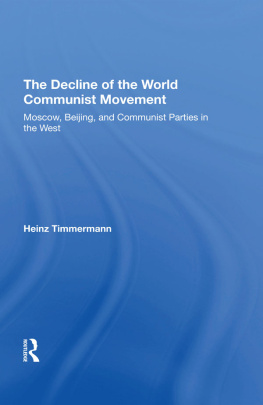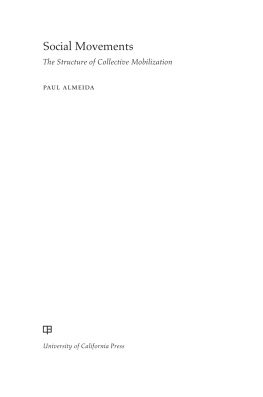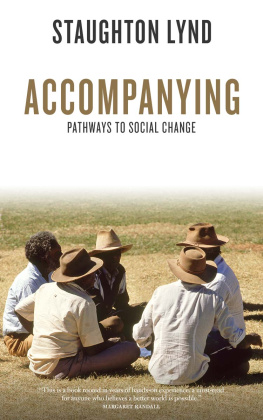The Communist Necessity
Prolegomena To Any Future Radical Theory
J. Moufawad-Paul
The Communist Necessity: prolegomena to any future radical theory
by J. Moufawad-Paul
ISBN: 978-1-894946-63-6
Copyright 2014 J. Moufawad-Paul
This edition copyright 2014 Kersplebedeb
first KINDLE edition 2014
Kersplebedeb Publishing and Distribution
CP 63560 CCCP Van Horne
Montreal, Quebec
Canada H3W 3H8
email:
web: www.kersplebedeb.com
www.leftwingbooks.net
contents
COMMUNISM. We know it is a word to be used with caution. Not because, in the grand parade of words, it may no longer be very fashionable. But because our worst enemies have used it, and continue to do so. We insist. Certain words are like battlegrounds: their meaning, revolutionary or reactionary, is a victory, to be torn from the jaws of struggle.
The Invisible Committee
Yesterday we had nothing. Today we have two great historical experiences rich in lessons, experiences which are present, which are alive in us... We must insist that the fact that there have been two restorations does not deny that the revolution is the main trend. To deny this fact is a pipe dream of reactionaries because the world proletarian revolution continues to advance and we are a part of that advance. It is undeniable that the world proletarian revolution will demand the cost of bloodshed, but what does not demand the cost of blood in this world? We ourselves would not be here without the lives sacrificed by so many communists and revolutionaries.
Peruvian Communist Party
overture
The leftist milieu in North America and Europe has now reached a point where the movementism of the late 1990s is approaching its limits. Following the collapse of the Eastern Bloc, Chinas descent into state capitalism, and the degeneration of abandoned and small socialist satellite states such as Cuba, the left at the privileged centres of global capitalism entered an era of chaos. Unwilling to accept that capitalism was the end of history, while at the same time believing that communism was a failed project, leftist organizations dealt with their confusion by either disintegrating or distancing themselves from the past. If the history of actually existing socialism had indeed proved itself to be a grand failure, then the only hope for the activist of the 1990s was to discover a new way of making revolution.
In those days, when fragile affinity groups embraced contingency and chaos in the hope that this disorganized method would somehow produce revolution, we imagined we were building something new. We were incapable of understanding that all we were doing was uncritically replicating past methods of organization that had already revealed their ineffectiveness prior to the spectacular failure of communism. We returned to anarchism without reflecting on the anarchist limits of the Spanish Revolution. We returned to disorganization without understanding all of those incoherent currents of socialism that had failed to build anything beyond utopian speculation. We refused to think through the problem of the state, forgetting the limits encountered by the communards in Paris. Incapable of understanding the precise meaning of the communist failure, we ended up repeating the past while imagining we were building something new.
The 1999 protests against the World Trade Organization in Seattle. The mobilization against the 2001 Free Trade Areas of the Americas Summit in Quebec City. The 2001 G8 protests in Genoa. These were the high-points of the anti-globalization movement. Together, along with other explosive moments of angry first world resistance, these struggles demonstrated a belief that innumerable and disconnected movements could topple capitalism, that their fractured efforts would intersect and amount to a critical breaking point. Eventually this practice would collide with the fact of highly organized and militarized states that, unlike the chaotic activists challenging the power of capitalism, were more than capable of pacifying discontent. This was movementism: the assumption that specific social movements, sometimes divided along lines of identity or interest, could reach a critical mass and together, without any of that Leninist nonsense, end capitalism.
By the time of the 2010 G20 Summit in Toronto this anti-capitalist methodology had already become a caricature of itself. The confrontations were echoed as tragedy or farce, there was a tired recognition that nothing would be accomplished, and the militants arrested were guilty only of demanding the right to protest. All of the high-points, if they were indeed high-points, of 1999 and 2001 were repeated in a tired and banal manner; the state remained unharmed, the activists resisting the state were punished. Before this farce, the coordinating committee of the 2010 demonstrations would absurdly maintain, on multiple email list-serves, that we were winning , and yet it could never explain what it meant by we nor did its claim about winning make very much sense when it was patently clear that a victory against the G20 would have to be more than a weekend of protests. Had we truly reached a point where victory was nothing more than a successful demonstration, where we simply succeeded in defending the liberal right to assembly? After all, it would be bizarre to assume that the people responsible for this triumphalist language actually believed that world imperialism would be defeated that weekend. They had already dampened their expectations, and when they spoke of winning they were simply demonstrating a defeatist acceptance of lowered stakes.
Those who refuse to recognize 2010 as a caricature, who continue to argue that this organizational form and strategy is the only way forward, are like the hippies of the 1960s: behind the times, focused on their glory days in the late 1990s and early 2000s, myopic in their inability to look beyond the boundaries of their time and space. They refuse to examine the past revolutions just as they refuse to examine the revolutionary movements of today, in those zones that they claim to defend against imperialism, that had never been enamoured with this movementist praxis. They are willing to settle for reformism and pretend that it is revolution, acting as if a successful defense of the right to assembly and the ability to make ones complaint heard are the only victories the movement can achieve.
In order to make sense of our impasse, we adopted new theories of organization, anything that did not resemble the failures of the past, desperately hoping we would find the holy grail that would make another world possible. We ventured out into theoretical terrains we believed were exciting because of the whirlwind jargon some theorists employed. We spoke of rhizomes, of bloom, of deterritorialization, of the multitude, of anything that did not completely resemble the old-fashioned jargon that stank of failure.
And yet our failures were not even world historical; we failed long before reaching those moments of grand failure that had disciplined us into adopting these alternative practices of rebellion. We were not even capable of replicating the failure of the Paris Commune, let alone the failures in Russia and China. We did nothing but protest, sometimes militantly agitating without any long-term plans, and fantasized that our activism was synonymous with revolution.
Meanwhile, even before we embarked upon this confused path of social movementism, peoples wars were being launched in those zones we claimed to represent under the auspices of a theory we had assumed was dead. Incapable of looking beyond the boundaries of our own practice, we often refused to recognize these movements, cherry-picking those moments of resistance that resembled our own practices. Instead of the Sendero Luminoso we championed a particular narrative of the Zapatistas; instead of Nepal we focused on Venezuela; instead of the Naxalites we lauded the Arab Spring. Possessing the privilege to ignore everything that did not resemble our supposedly new way of seeing the world, we dismissed anything that could teach us otherwise.








